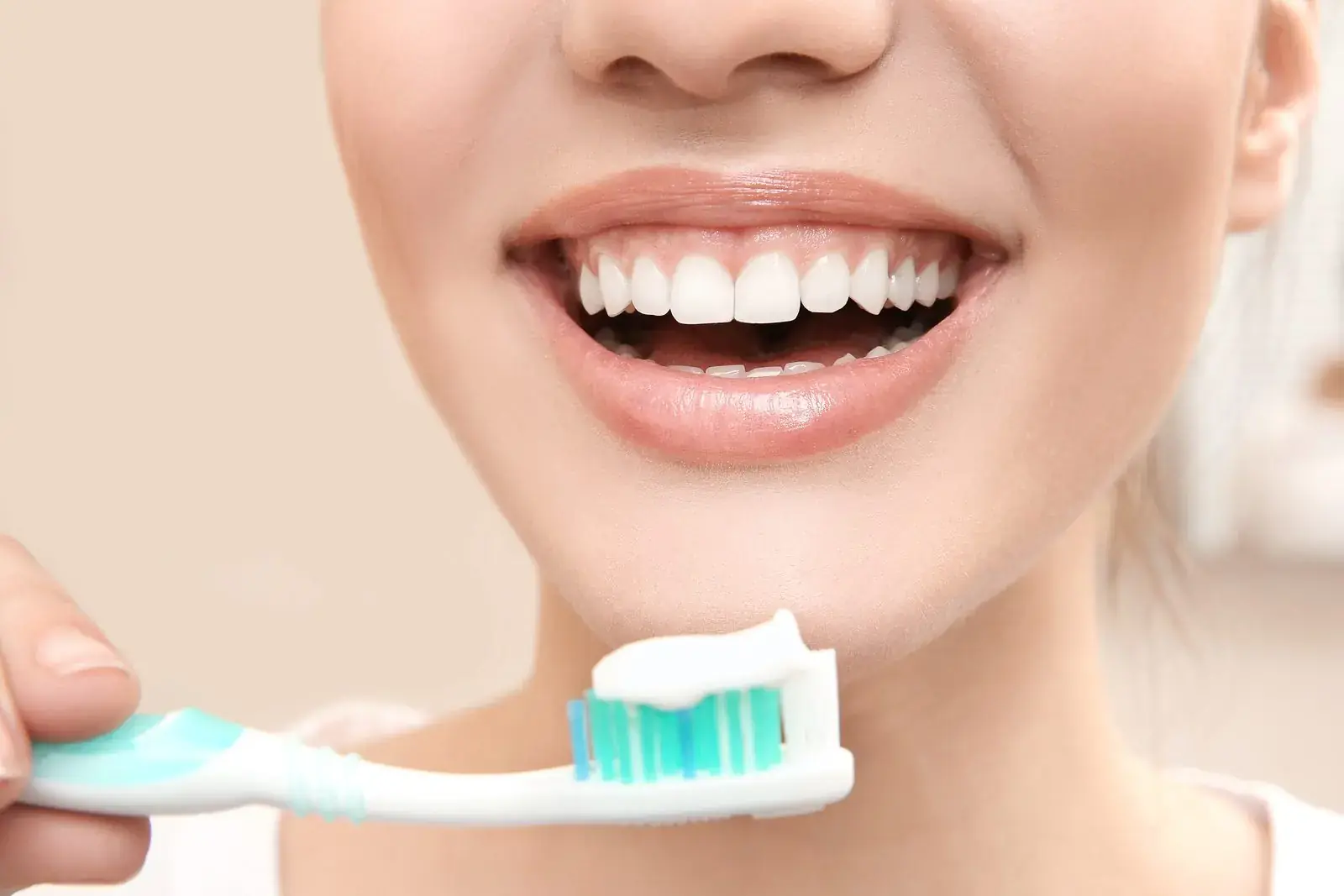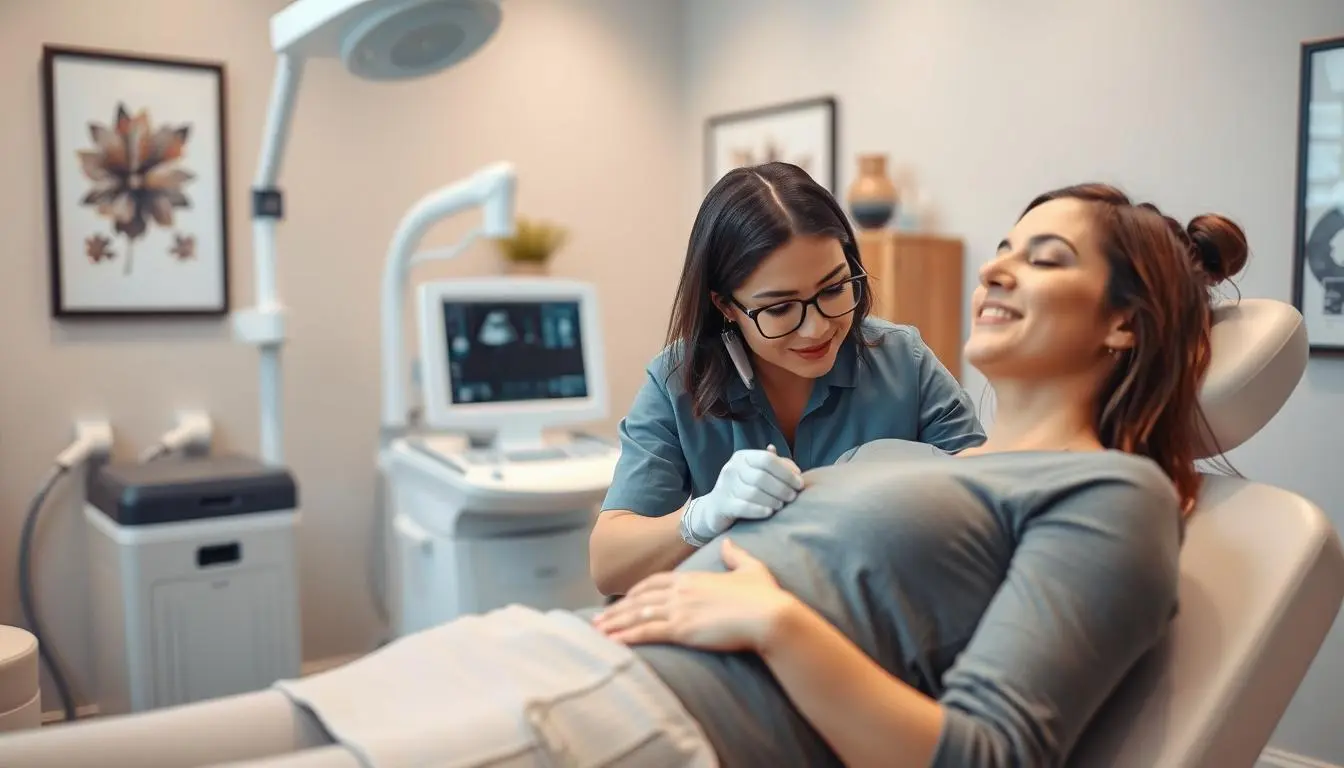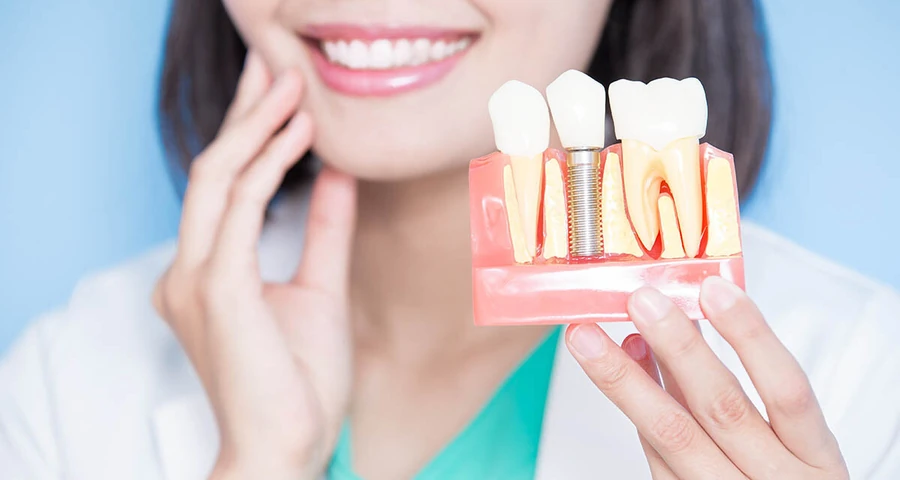Your mouth feels tender, a little puffy, and honestly — kind of gross. You’ve made it through the whole wisdom teeth removal thing, but now this weird, slightly panicked question hits you in the middle of the night: Can you brush your teeth after wisdom teeth removal… or will that mess everything up?
Short answer? Yes, you can. Just not in the way you’re used to. Not yet, anyway.
This isn’t your regular brush-rinse-go kind of week. Right now, there’s a healing extraction site (or maybe four), a blood clot doing its fragile job, and an entire oral surgery recovery process to respect. So yeah, brushing matters — but so does knowing when to do it, where to avoid, and how not to accidentally ruin everything with one too-eager swipe of your toothbrush.
We’ll walk through all of it — what to use, what to skip, and exactly how to keep your mouth clean without disturbing the delicate surgical site. You’ll also get a few real-world tips (and mistakes to avoid) that dentists might not put on the little printout they send you home with.
Let’s start with the obvious question…
Why Brushing Feels So Confusing After Wisdom Teeth Removal?
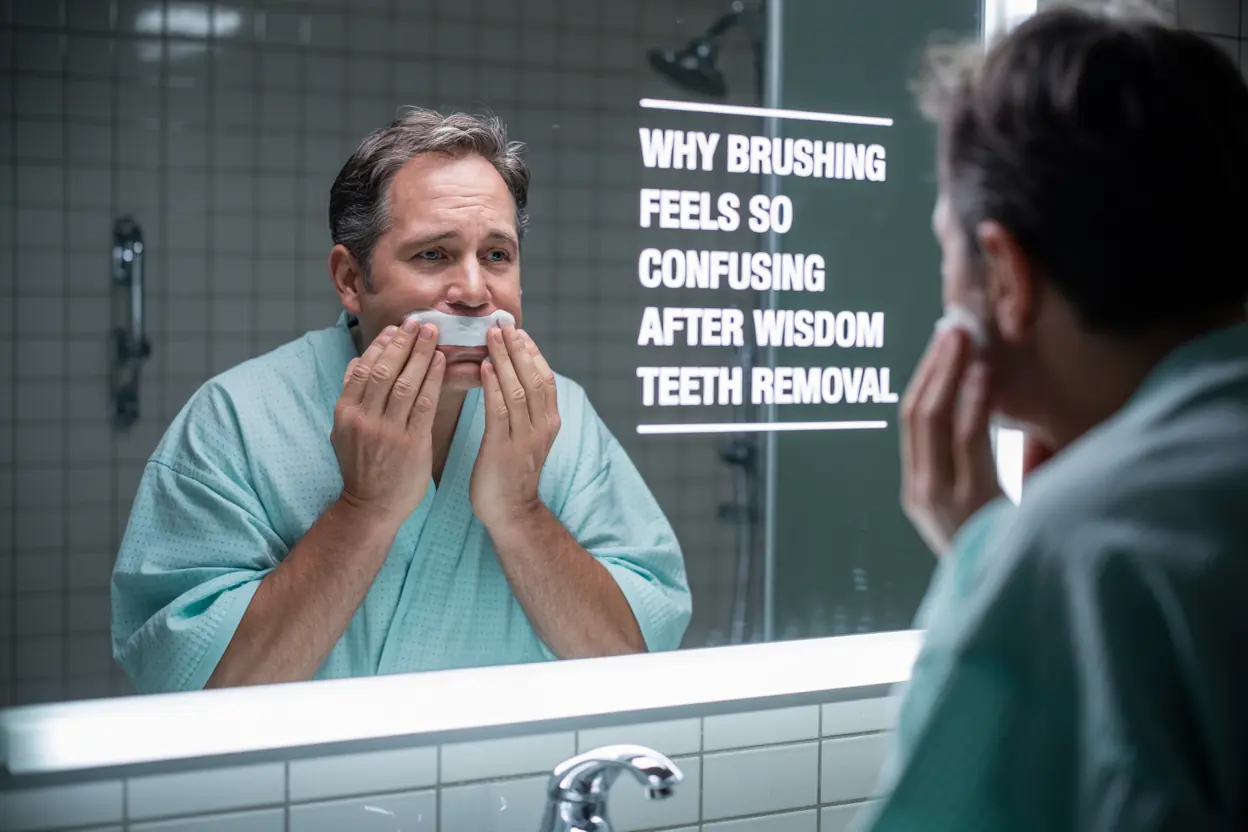
You’d think brushing your teeth would be straightforward. But right can you brush your teeth after wisdom teeth removal, everything feels… uncertain. You’re sore, your mouth feels like it’s been through a minor war, and suddenly the act of swishing water or touching a toothbrush to your molars feels like a high-stakes decision.
The real issue? The extraction site is vulnerable — there’s a fresh blood clot that’s crucial to healing, and if you mess with it too early, it could lead to dry socket (which, just to be clear, is as painful as everyone says). So brushing isn’t about if you should, but how gently and where to focus — especially in those first few days.
And honestly, the fear of brushing “wrong” is real. Do you skip it and risk bacteria building up? Do you go for it and risk irritating the surgical area?
This is where a careful, modified oral hygiene plan comes in. And that’s exactly what we’ll walk through — the day-by-day approach, gentle brushing techniques, and the tools that help keep things clean without interfering with recovery.
I. Why Oral Hygiene Still Matters After Wisdom Teeth Removal?
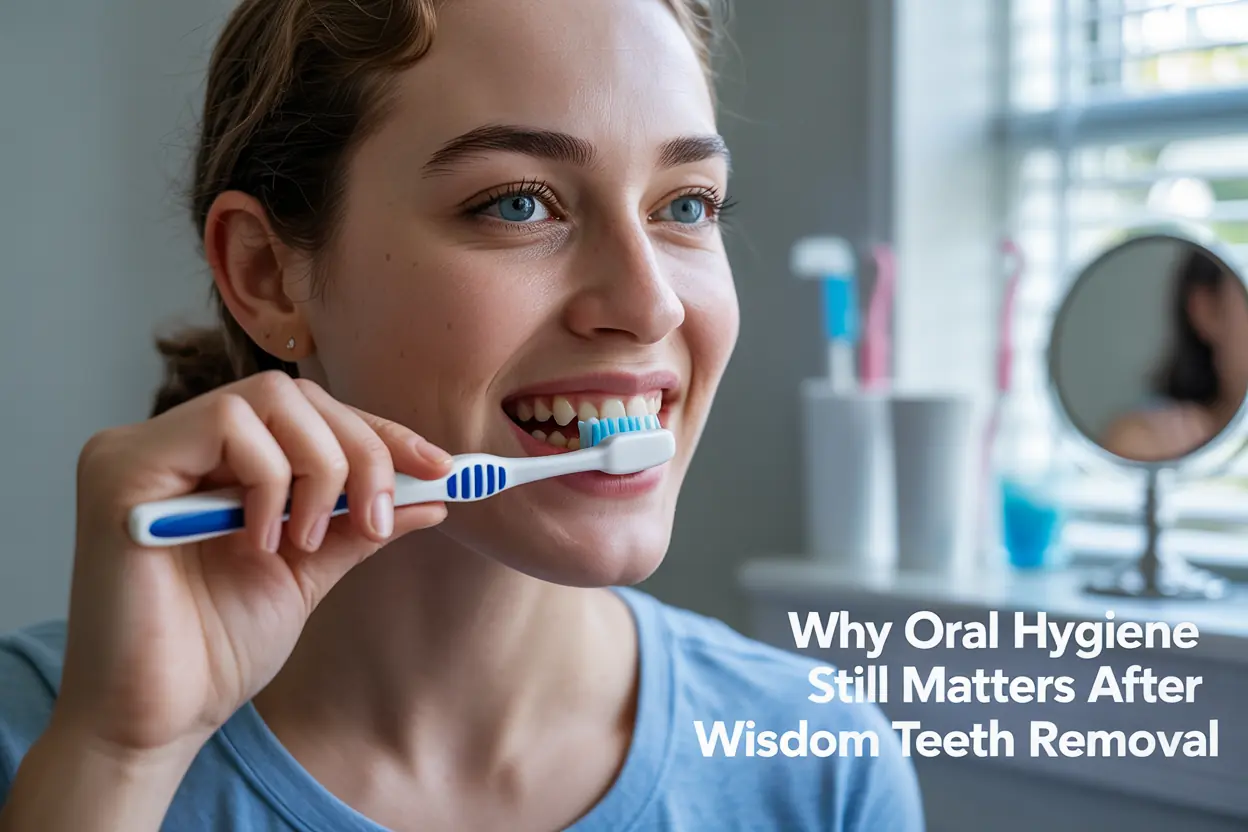
Let’s be honest — it’s tempting to avoid your mouth altogether after surgery. Everything feels sore, weird, or slightly off-limits. But here’s the thing: your mouth is full of bacteria, and skipping brushing altogether is a fast track to infection. Can you brush your teeth after wisdom teeth removal? Even if you’re on a soft foods diet and avoiding anything crunchy, plaque and food debris will still sneak in.
So, even though it feels counterintuitive, gentle brushing is part of your healing process. Not brushing increases your risk of oral infections, slows down recovery, and — in some cases — leads to stuff like bad breath, irritated gums, or even dry sockets if bacteria spreads.
That said, this isn’t the time to go all-in with your electric toothbrush or scrub like you’re cleaning a coffee stain. It’s more like… cautious dusting.
You’re protecting that fragile blood clot, the surrounding gum tissue, and any surgical stitches your oral surgeon may have placed with cost to remove wisdom teeth. The goal isn’t perfection. It’s prevention.
II. When Can You Start Brushing After Wisdom Teeth Removal?
Here’s the part that makes people nervous: the first day after your wisdom tooth removal is mostly a no-go when it comes to brushing near the surgical site.
That blood clot forming in the extraction site? It’s doing a crucial job. If you disturb it — by brushing too close or rinsing too hard — you could wind up with a dry socket, which honestly feels as unpleasant as it sounds. So for the first 24 hours, be super careful.
But don’t confuse caution with doing nothing. You can brush the other parts of your mouth — just avoid the areas near your impacted teeth or where the stitches are.
Here’s a quick breakdown:
| Day | Brushing Guidelines |
| Day 1 | Brush front teeth gently; skip surgical area completely |
| Day 2–3 | Resume brushing more of the mouth, avoiding direct contact with the healing area |
| Day 4+ | Begin brushing gently around the wisdom tooth socket (if no excessive pain or swelling) |
Pro Tip: If you’re unsure whether it’s time, check with your dental care provider or the oral surgeon who performed the procedure. Healing can vary — especially with impacted wisdom teeth or more invasive extractions involving IV sedation or general anesthesia.
III. How to Brush Without Disturbing the Healing Site
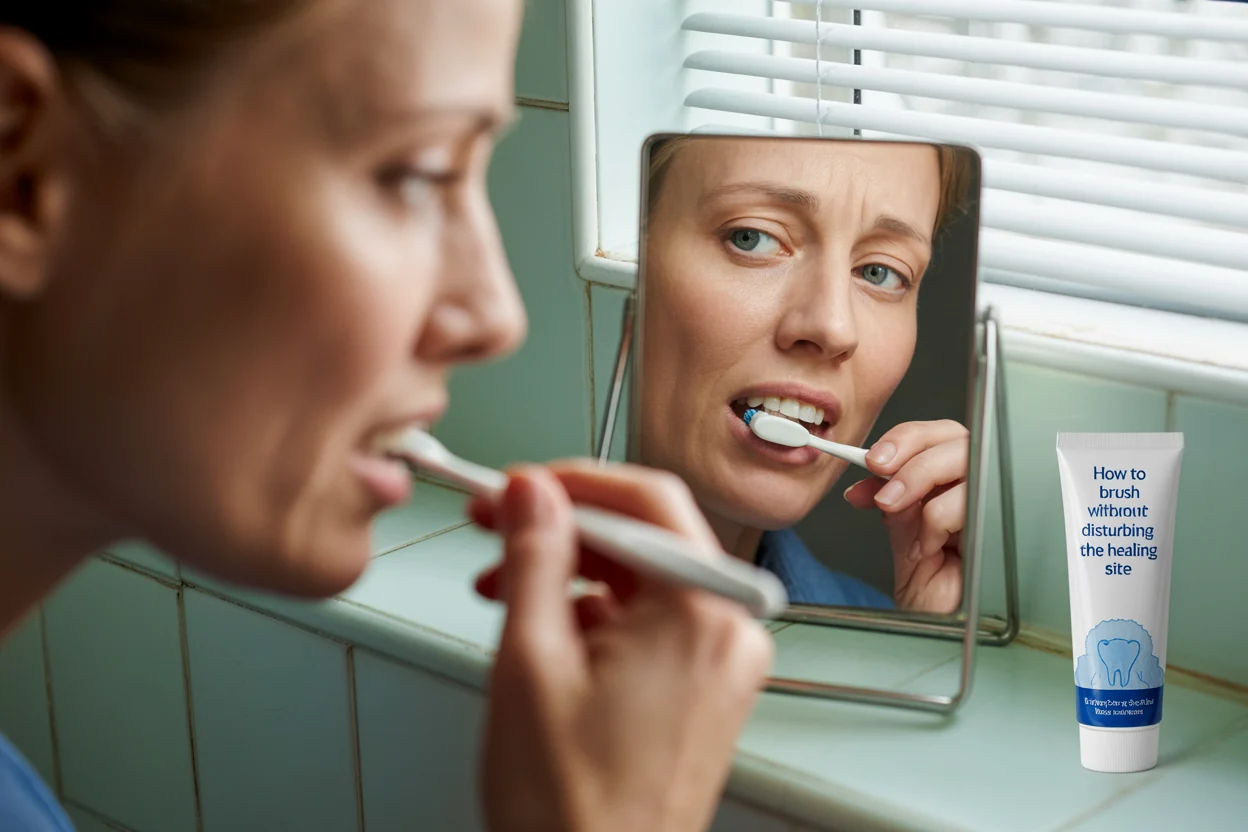
Okay, let’s say it’s Day 2. You’re cleared to brush (sort of). Now what?
First rule? Go slow. Second? Use a soft-bristled toothbrush — ideally one made for post-operative care or gentle dental hygiene. The goal isn’t to feel “fresh” so much as to avoid any setbacks in your healing process.
Try this technique:
- Use small circular motions around your teeth — not back-and-forth scrubbing
- Don’t open wide suddenly — ease into your brushing angle
- Tilt your head to see better without straining the surgical area
- Instead of spitting with force, let water and toothpaste dribble out gently
Avoid:
❌ Mouthwash with alcohol (too harsh)
❌ Whitening pastes or foaming agents
❌ Your regular pressure or speed — even if you think you’re being gentle
PRO TIP: Pretend you’re “polishing” your teeth rather than cleaning them. That mindset alone can help reduce the instinct to scrub.
Brushing during recovery isn’t about perfect dental hygiene. It’s about not setting yourself back — because, let’s face it, going back for a second round of healing isn’t something anyone wants.
IV. Don’t Use These Products Right Away
It’s tempting — especially when your mouth tastes a little… off — to reach for your usual arsenal of minty freshness. But right after oral surgery, that’s not what your healing area needs. In fact, some everyday dental products can make things worse.
Here’s what to skip for now:
- Alcohol-based mouthwashes: They sting. And they can dry out the gum tissue, slowing the healing process.
- Whitening toothpaste: Those harsh agents? Not exactly friendly to a tender surgical site.
- Electric toothbrushes: Even the gentle ones vibrate just enough to possibly disturb the blood clot or stitches.
- Strong antiseptic solutions (like hydrogen peroxide): They sound helpful, but they’re too aggressive this early on.
You might feel like your mouth isn’t getting “clean enough,” but trust that salt water and light brushing are doing more than enough. You’re not aiming for fresh-from-the-dentist clean — just keep-the-area-safe clean.
Pro Tip: If you’re craving freshness, rinse with lukewarm saline water or ask your dental team about a non-alcoholic antiseptic mouthwash made specifically for post-op care.
V. When Can You Resume Brushing the Extraction Site Directly?
So — when can you go back to brushing the actual extraction site? when it stops feeling like a raw nerve. usually by Day 4 or 5, assuming things are healing normally.
But let your pain level be your guide. If your mouth still feels swollen or sensitive when you sleep after wisdom teeth removal, wait another day or two. There’s no gold medal for brushing early.
Here’s a general flow:
| Time Frame | Brushing Near Surgical Site |
| Day 1 | Definitely not. |
| Day 2–3 | Maybe near the area — but gently and indirectly. |
| Day 4+ | Start brushing around it softly with a soft-bristled toothbrush. |
Technique reminder:
- Brush around the edges, not directly over the socket.
- Keep pressure light.
- Let water and foam fall out — avoid spitting forcefully.
And yes, you still need to avoid dislodging that blood clot. No one wants to end up back in the chair dealing with dry socket, which can happen if brushing is too aggressive too soon.
PRO TIP: Stand under soft lighting and use a handheld mirror to navigate around the surgical area without guessing. You’ll feel more in control — and less likely to make a mistake.
VI. Saltwater Rinses vs. Brushing
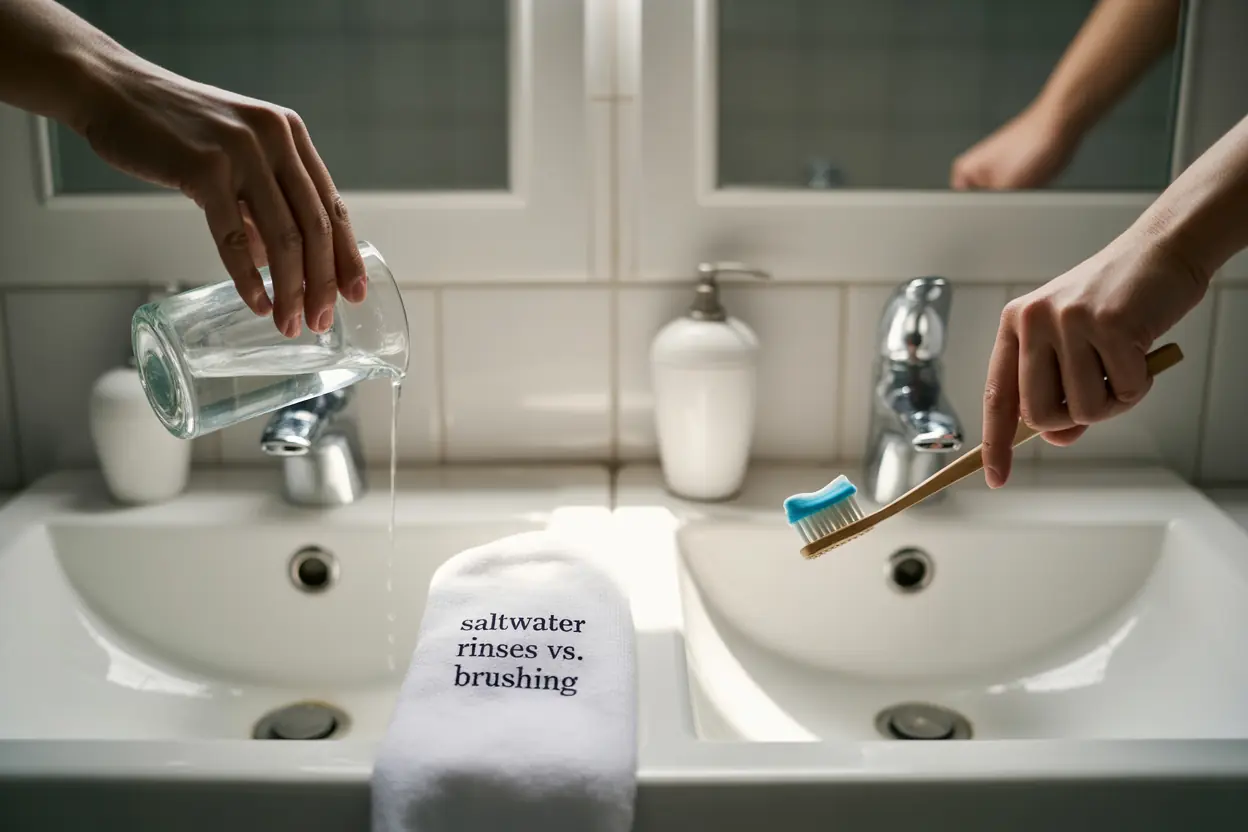
Let’s face it — brushing right after a tooth extraction isn’t exactly your mouth’s favorite activity. That’s where saltwater rinses come in. Simple, soothing, and surprisingly effective.
But when do you rinse? And when do you brush?
| Care Routine | What It Does | When to Use |
| Brushing | Removes plaque and leftover food | Day 2 onward (away from surgical area) |
| Saltwater rinse | Cleans gently, supports healing | Start 24 hours after surgery |
| Antiseptic rinse (if advised) | Kills bacteria | Ask your dental professional first |
How to rinse:
- Mix ½ teaspoon of salt in a cup of lukewarm water — not hot
- Gently swish or just hold it in your mouth
- No swishing hard or spitting — let it fall out naturally
Think of it as a spa treatment for your extraction site. Calm. Healing. Low drama.
Pro Tip: If salt water makes you gag (hey, it happens), ask your oral surgeon if a non-alcoholic antiseptic mouthwash like those from Advanced Dental Arts or Maplewood Dental Associates is a better option for you.
VII. Brushing With Stitches: Special Considerations
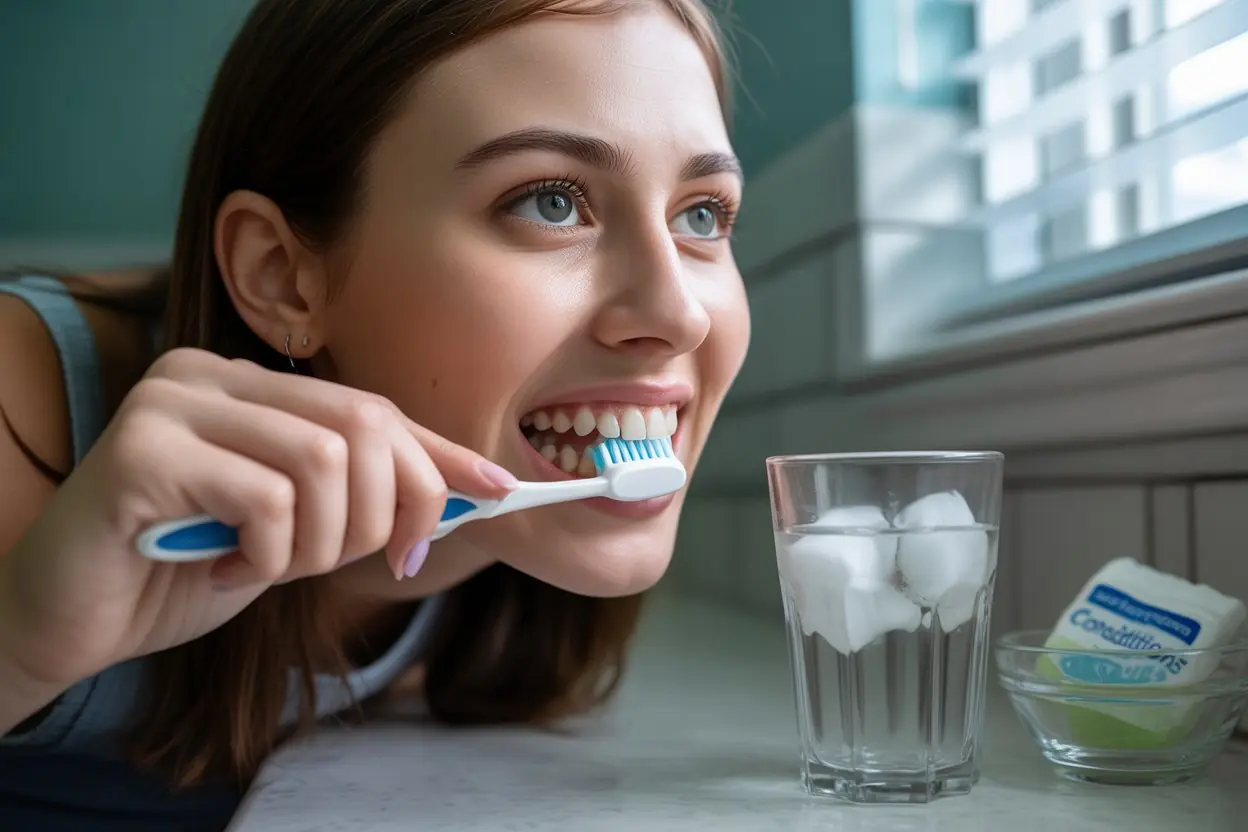
Now, about those stitches. If your oral surgeon used sutures, you’re probably wondering: Can I brush near them? Will I accidentally yank one out?
Here’s the lowdown.
There are two main types:
- Dissolvable stitches (most common)
- Non-dissolvable stitches (you’ll need a follow-up visit to remove them)
Things to keep in mind:
- Brush around, not directly on, the surgical stitches
- If a stitch looks loose, don’t pull it — let your dental team handle it
- Feeling one come out on its own (usually around Day 5–7)? Totally normal
- If brushing causes bleeding or sharp pain, pause and check in with your dentist
| Type of Stitch | Care Tip |
| Dissolvable | Let them fall out naturally. Brush gently nearby. |
| Non-Dissolvable | Avoid direct contact. Dentist will remove. |
Q to Consider: Can brushing dislodge stitches after wisdom teeth removal?
Not likely if you’re gentle — but if you’re using an electric toothbrush or rushing through your brushing technique, the risk goes up. This is where a manual toothbrush and patience win.
VIII. What Happens If You Don’t Brush After Wisdom Teeth Removal
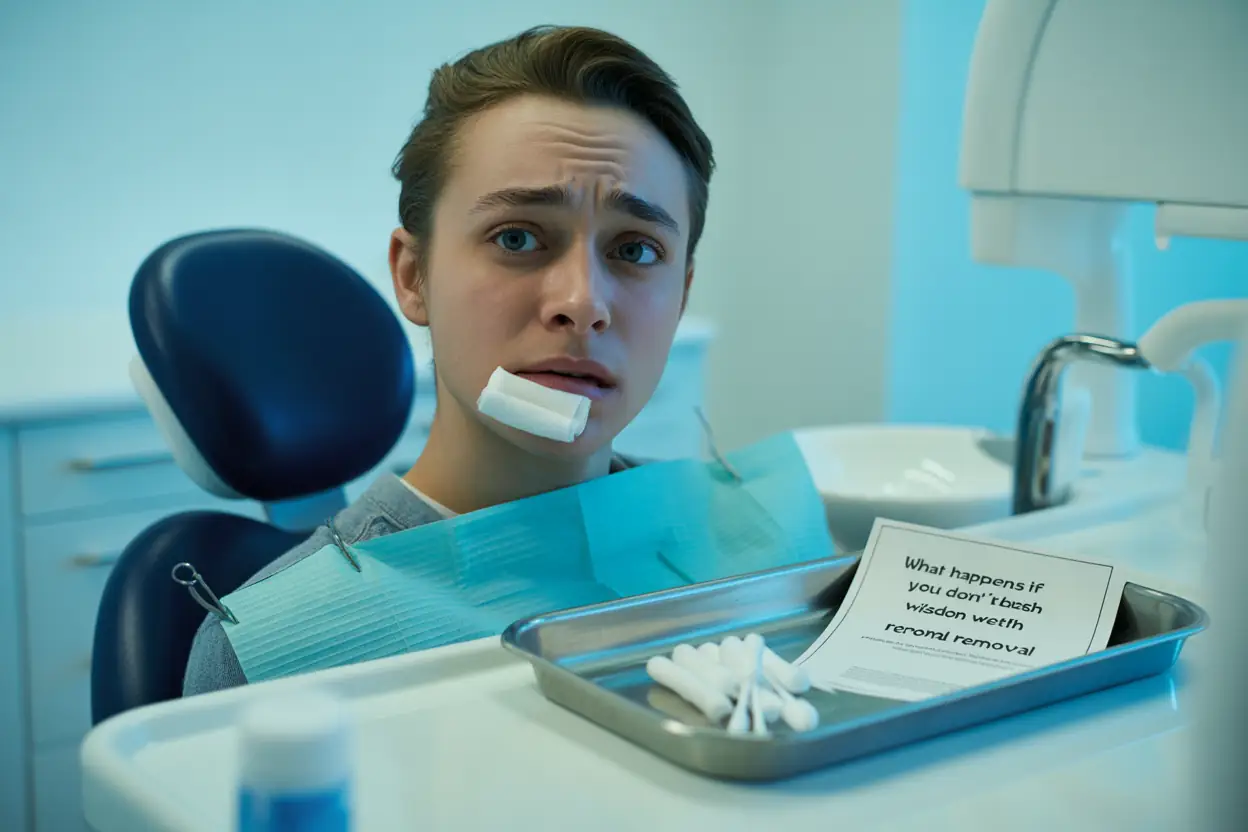
You might think skipping brushing for a few days isn’t a big deal. Your mouth hurts, your energy’s low, and maybe you’re living off soft foods and smoothies anyway — so what’s the harm?
Honestly? More than you’d think.
Can you brush your teeth after wisdom teeth removal, gives bacteria a blank check to hang out around the extraction site, especially in those little corners where food can hide. That soft, healing gum tissue? Yeah, it’s vulnerable right now.
Here’s what can happen if you avoid brushing entirely:
- Plaque buildup → leads to infection
- Trapped food debris → smells bad, feels worse
- Dry socket risk increases → especially if bacteria interfere with the blood clot
- Delayed healing → your post-op care plan starts to backfire
| Consequence | Why It Matters |
| Bad breath | Sign of bacterial growth near the surgical area |
| Infection | Can extend recovery time and cause more pain |
| Dry socket | Blood clot dislodges, exposing nerve and bone |
| Inflammation | Makes brushing harder later, slows the healing process |
Pro Tip: Even if you can’t brush the surgical site just yet, gently brushing the rest of your mouth — and rinsing with salt water — helps you stay ahead of complications.
IX. What to Do If Brushing Hurts
Pain when brushing after surgery is… frustrating and not help with wisdom teeth. You want to do things right, but every swipe feels like a mistake. So — what are your options?
First off, don’t force it. If the discomfort is intense, it might be your body’s way of saying: not yet. That’s fine — there are workarounds.
Try these until brushing feels safe again:
- Use a soft damp gauze pad to wipe away plaque from front teeth
- Saltwater rinse or saline solution to keep the socket clean without pressure
- Oral syringe (if recommended by your oral surgeon) to flush trapped food gently
- Herbal tea rinse like cooled chamomile — soothing and mild (but double-check with your dentist first)
And remember — electric toothbrushes are often too aggressive early on. If you’re brushing, use a soft-bristled manual toothbrush, ideally one made for post-operative care.
Pro Tip: Some dental surgeons recommend holding your lip up with one finger to get a better angle without tugging the sore area. Feels awkward, and works like a charm.
If brushing pain lasts more than a few days — or worsens — reach out to your dental team, local cosmetic dentist, or clinic like Implant & Periodontic Specialists or Century Stone Dental. You might have a minor dental concern that needs a check.
X. Best Oral Hygiene Tools for Recovery
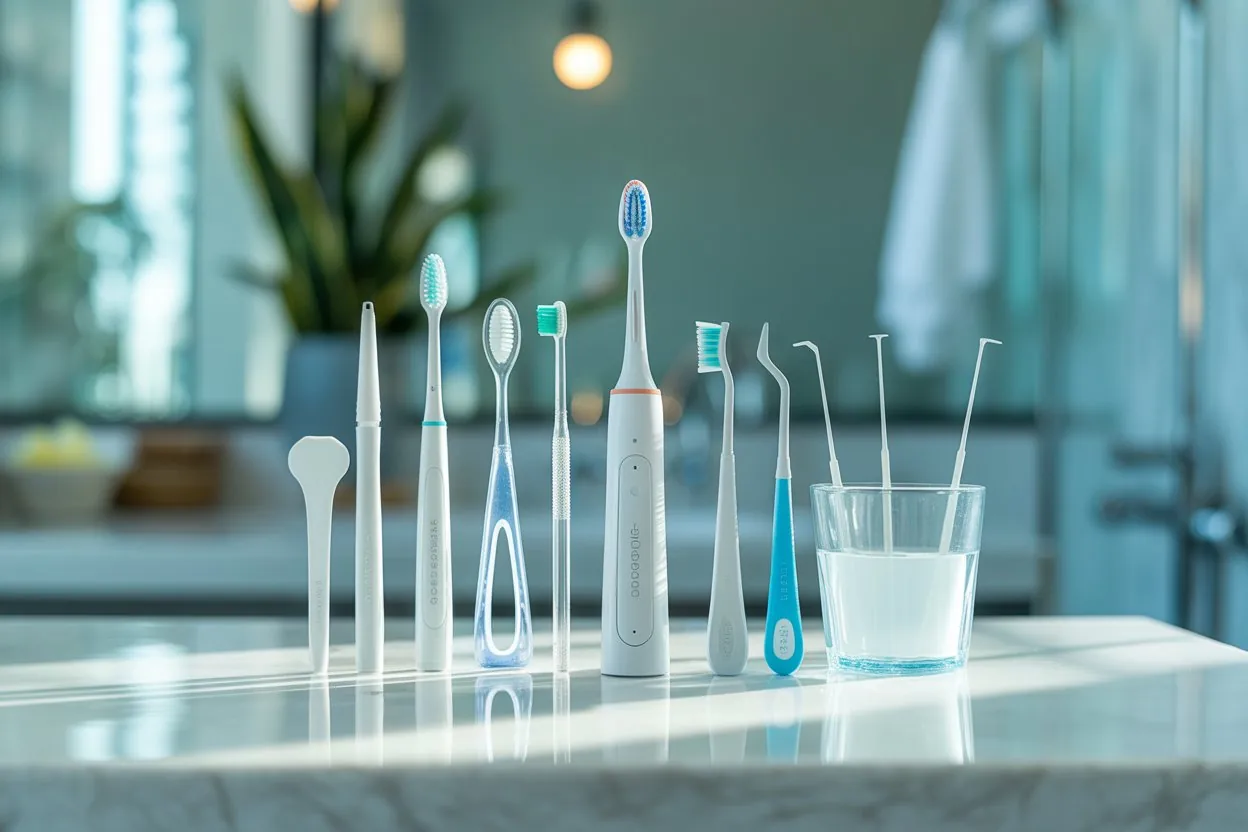
You’ve just had oral surgery. Your mouth is tender. You’re trying to avoid disturbing the surgical site, but also want to stay on top of your oral hygiene. It’s a weird balancing act.
Here’s the truth: having the right tools makes everything easier — and less painful.
Let’s build your post-operative dental care kit:
| Tool | Why It Helps | When to Use |
| Ultra-soft toothbrush | Gentle on stitches and sore gums | Day 2 onward (not near sockets) |
| Saltwater rinse packets | Cleans without pressure | 24 hrs post-op and onward |
| Oral syringe (if provided) | Flushes trapped food gently | Day 3+ if food gets stuck |
| Non-foaming toothpaste | Reduces irritation and helps avoid dry socket | As soon as brushing resumes |
| Dental mirror | Helps see healing areas without poking | Optional but helpful anytime |
| Lip balm | Keeps lips from cracking (trust us) | Before and after brushing |
Pro Tip: Look for a manual toothbrush specifically labeled for “post-surgery” or “sensitive gums.” Brands like TePe or Curaprox are often recommended by oral health professionals.
Avoid anything flashy — no whitening toothpaste, no mint overload, no electric toothbrush unless your dentist says it’s okay. Gentle is the goal.
XI. Can Brushing Cause Dry Socket?
Ah, the dreaded dry socket. If you’ve read anything about wisdom tooth removal, this term probably haunts you already. Can you brush your teeth after wisdom teeth removal? And yes — brushing too soon or too aggressively can be part of the problem.
Let’s break it down.
Dry socket happens when the blood clot protecting your extraction site gets dislodged. That clot is basically your body’s built-in bandage. Lose it, and suddenly your bone and nerves are exposed.
Brushing mistakes that might cause dry socket:
- Scrubbing near the surgical area too soon
- Using a stiff brush or foaming toothpaste that irritates tissue
- Spitting hard after brushing (which creates suction)
- Rinsing too forcefully (even with salt water)
Signs of a dry socket you shouldn’t ignore:
- Throbbing pain 3–5 days after surgery
- Bad breath or blood-tinged saliva
- Unpleasant taste that won’t go away
- Bone visibly exposed where the gum tissue should be healing
Pro Tip: Don’t brush directly over the extraction site until at least Day 4, and even then — treat it like glass. A soft touch now means a faster healing process.
And if you’re worried you’ve done something wrong, contact your oral surgeon or dental care provider. Clinics like Maplewood Dental Associates or Schellenberg Dental are known for their solid post-operative care advice.
XII. Dentist-Approved Tips for Keeping Your Mouth Clean
Let’s face it — no article can replace your own oral surgeon or dental care provider, but a few expert-backed reminders can absolutely help.
These tips come from real dentists — some passed on directly from clinics like Greater Modesto Dental Implant & Oral Surgery Center, Springhill Dental Center, and Dr. Amin Samadian’s practice. Others are grounded in ADA guidelines and trusted post-op protocols.
🧼 Dentist-Backed Do’s:
- Use lukewarm salt water rinses 2–3 times daily starting 24 hours post-surgery
- Stick with a soft-bristled toothbrush — no aggressive brushing, no electric brushes early on
- Clean your tongue and roof of your mouth gently — bacteria love hiding there
- Replace your toothbrush after surgery to avoid reinfection
- Stay hydrated — it helps tissue repair and keeps your mouth flushed
Pro Tip: Keep extra gauze pads on hand. If light bleeding restarts during brushing, gently biting on gauze for 20–30 minutes can usually stop it.
And honestly? If anything feels “off” — like weird swelling, new pain around the surgical area or foul taste of eating after wisdom teeth removal, — don’t overthink it. Just call your dental team. That’s what they’re there for.
🔚 Conclusion
So… can you brush your teeth after wisdom teeth removal?
Yes, but timing and technique really matter. The first 24 hours are sacred — after that, it’s all about gentle motions, soft tools, and listening to your body (and your dentist).
Keeping your mouth clean isn’t just about avoiding grossness. It’s a big part of your healing process — helping prevent dry sockets, avoiding oral infections, and making sure your gum tissue bounces back.
And hey, if brushing feels stressful at first, take it one small step at a time. Most people figure it out — awkwardly — and heal just fine.
Still unsure about your routine? Call your dentist. Or better yet, check out our full post-surgery recovery guide for step-by-step help — including soft food ideas, salt water rinse recipes, and real talk about what to expect.
💬 Frequently Asked Questions
1. Can I brush my teeth 12 hours after wisdom teeth removal?
It’s best to wait a full 24 hours. Brushing too soon risks disturbing the blood clot and increasing dry socket.
2. Is it okay to use toothpaste after surgery?
Yes, but stick with gentle, non-whitening toothpaste. Avoid anything foamy or minty until at least Day 2–3.
3. Can brushing cause dry socket?
Yes — if you brush too aggressively or too early. Be especially careful around the healing site.
4. Should I brush near the stitches?
Only after a few days, and even then, very gently. If in doubt, brush around but not directly on the stitches.
5. When can I brush normally again?
Usually by Day 5–7, depending on how your healing area feels. Check with your oral surgeon if you’re unsure.
6. What if I forgot to brush after surgery?
Don’t panic. Rinse with warm salt water, then gently brush the next chance you get (avoiding surgical sites).
7. Is mouthwash a substitute for brushing?
Not really. Especially not alcohol-based ones. Rinses help, but they don’t replace brushing — they complement it.
8. What toothbrush is best after oral surgery?
Use a soft-bristled or post-surgery toothbrush. Some people prefer a child-size brush for better control.
9. Can I brush the tongue and roof of my mouth?
Yes — and you should. Just do it gently and avoid suction or hard motions.
10. What’s the safest way to clean my mouth on Day 1?
Skip brushing. Stick to light saltwater rinses (after meals if possible) and leave the surgical area alone.

